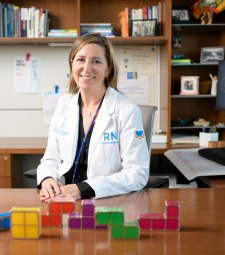Leading Care: Dr. Elizabeth S. Rodriguez and Memorial Sloan Kettering Cancer Center
In this interview, Elizabeth S. Rodriguez '98 BSN, DNP, RN, OCN©, CENP© discusses her leadership in advancing nurses and health care through administrative roles.
She is Director of Nursing, David H. Koch Center for Cancer Care, Memorial Sloan Kettering (MSK) Cancer Center, New York, New York

How did you rise to this leadership position?
In 2001, I decided to pursue a graduate degree at New York University. This was after consistent coaching from faculty at Villanova who always encouraged us to go further in school. I initially enrolled in a nurse practitioner program. At work, I was engaged in our shared governance councils and outside of work I was active in the Oncology Nursing Society assuming leadership roles. Early on in my graduate work, my nurse leader at the time coached me into switching to a nursing administration track. Shortly after I graduated in 2005, I became nurse leader for outpatient services at one of our MSK locations in Manhattan. In 2008, I went back to school again to Duke University in the Doctor of Nursing Practice program knowing that I wanted to increase my sphere of influence and span of control preparing myself for an executive leadership position in a complex health system.
Who influenced you?
Early on, I was influenced most by my mom. She always told me I could do anything I wanted. This instilled incredible self-confidence and drive.
Why is your work important to you?
My work is important to me because I believe in the mission at MSK.
Why are you enthusiastic about your work in this role?
I’ve always loved caring for patients at the bedside. When I moved into leadership positions 16 years ago, I knew that I could have wider sphere of influence with the potential to impact patient care more broadly. I’m passionate about caring for people to empower them to be their best selves; caring for patients is a lot like caring for nurses. I strive to enable the nurses with the resources they need to do a great job and deliver high quality care.
How are you effective in your role?
I learned early on that building self-awareness is key to developing as a leader.
What’s critical to your success in the role?
Being inclusive and building relationships is crucial. Connecting with diverse groups of people helps to understand perspectives and allows opportunities to gain new insights.
How does innovation fit into your role as leader?
Since the advent of the profession, nurses innovated. Nurses play an essential role in creative re-design of care delivery systems, including the meaningful integration of recent technologies, while optimizing patient and family centered care.
Is there anything you wish you’d done differently on your rise to this position or while in it?
As a rising leader, I wish I’d spent more time building my financial acumen. Having an exquisite understanding of the business of healthcare is essential to advocate for resources and demonstrating value (or return on investment) in the contributions of nurses.
What’s your advice to someone who wants to be a leader in their area of interest?
Find a mentor. Do the work to learn about yourself; not only about your strengths but to truly understand your areas of opportunity and make a commitment to develop.
What is your leadership philosophy?
I empower nurses to practice with autonomy so that they may positively influence the patient and family care experience.
What’s your hope for our profession?
Nurses are well known for caring; my hope is that Nurses will receive recognition as clinicians who provide evidence-based care, who innovate, and who contribute to new knowledge through leadership in research and collaboration in clinical trials.
What thoughts would you like to add about the effect of the pandemic on your work?
The pandemic demonstrated efficient, rapid cycle prototyping works and implementation of new processes can happen safely through continuous evaluation.
Do you foresee changes in the future, including opportunities for nurses where they can have a positive impact?
During the pandemic, care shifted rapidly and at broad scale from in person to virtual for patients not requiring hospitalization. Nurses are well poised to deliver care to patients’ homes from a distance using technology including electronic messaging, video, patient reported outcome tools, and remote monitoring devices. Novel care delivery methods hold the potential to improve quality of life and patient outcomes by reducing unnecessary trips to outpatient clinics, emergency rooms, and hospital admissions through early intervention.
